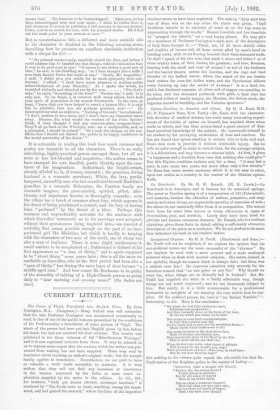CURRENT LITERATURE.
The Poems of Virgil, Translated into Engitidh. Prose. By john Conington, MA. (Longman.)—Many Oxford men will remember that the late Professor Conington was accustomed oecaaionally to read, in lien of one of the public lectures prescribed by the conditions of his Professorship, a translation of some portion of Virgil. The whole of the poems had been put into English prose by him before his death, but had not received his final revision. The version was published in the three volumes of hid "Miscellaneous and it is now reprinted verbatim from them. It may be allowed to us to express some regret that the revision which the writer was pre- vented from making has not been supplied. There may well be hesitation about touching an author's original work ; but the scruple hardly applies to translation. Nevertheless, we are glad to have so valuable a work made accessible to students. It is very seldom that they will not find any looseness or inaccuracy in the version corrected by the fuller, or more exact ex-
planation supplied by the notes in the edition. In viii., 657, for instance, " Galli per dumos aderant, arcemque tenebant," is rendered by "The Gauls were at hand, marching among the brush- wood, and had gained the summit," where the force of the imperfect
tenebant seems to have been neglected. The note is, "Livy says that one of them was on the top when the alarm was given. Virgil • doubtless intends us to conceive of some as on the top, some as approaching through the woods." Messrs. Lonsdale and Lee translate by "grasped the citadel," not a very happy phrase. We may give as a specimen of Professor Conington's style part of the description of Italy from Georgic ii. :—" Think, too, of all those stately cities and trophies of human toil, all those towns piled by man's hand on beetling rocks, with rivers flowing beneath their time-honoured walls. Or shall I speak of the two seas that wash it above and below ? or of those mighty lakes, of thee, Larius, the greatest ; and thee, Benttous, heaving with the swell and roar of oceans ? or tell of the harbours and the barrier thrown across the Luorine, and the rage and loud thunder of the baffled waves, where the sound of the sea beaten back echoes far over the Julian wave, and the Tyrrhenian billows come foaming up into the creeks of Avernus P It is a land, too, whiol: has disclosed currents of silver and of copper ore mantling in its veins, and has streamed profusely with gold; a land that has produced tribes of manly temper, the Marsian, the Sabine stock, the Ligurian inured to hardship, and the Volscian spearmen."


































 Previous page
Previous page